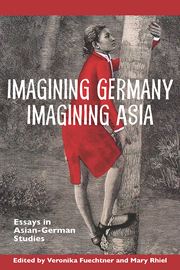Book contents
- Frontmatter
- Contents
- Acknowledgments
- Introduction
- Part I Contemporary Challenges to German Borders and Identities
- Part II Travel and Representation
- 5 Germany's India: A Critical Re-interrogation
- 6 Indians, Jews, and Sex: Magnus Hirschfeld and Indian Sexology
- 7 The Ambivalence of a Spiritual Quest in India: Waldemar Bonsels's Indienfahrt
- 8 Traveling through Imperialism: Representational Crisis and Resolution in Elisabeth von Heyking's and Alfons Paquet's Travel Writing on China
- 9 Measuring Asian-ness: Erwin Baelz's Anthropological Expeditions in Fin-de-Siècle Korea
- Part III Asia Inhabits Germany's Cultural and Intellectual History
- Bibliography
- Notes on the Contributors
- Index
5 - Germany's India: A Critical Re-interrogation
from Part II - Travel and Representation
- Frontmatter
- Contents
- Acknowledgments
- Introduction
- Part I Contemporary Challenges to German Borders and Identities
- Part II Travel and Representation
- 5 Germany's India: A Critical Re-interrogation
- 6 Indians, Jews, and Sex: Magnus Hirschfeld and Indian Sexology
- 7 The Ambivalence of a Spiritual Quest in India: Waldemar Bonsels's Indienfahrt
- 8 Traveling through Imperialism: Representational Crisis and Resolution in Elisabeth von Heyking's and Alfons Paquet's Travel Writing on China
- 9 Measuring Asian-ness: Erwin Baelz's Anthropological Expeditions in Fin-de-Siècle Korea
- Part III Asia Inhabits Germany's Cultural and Intellectual History
- Bibliography
- Notes on the Contributors
- Index
Summary
It is this taking for granted that has, I think defused much of the potential, especially the political potential, of Said's project, through no fault of his own; for he has in effect been Orientalized by the academy.
—Saree MakdisiMoral outrage has some therapeutic value, but as a political strategy it is useless.
—Tariq AliWhy is a re-interrogation productive? I asked myself this question when I went back over my 2001 book India: The Seductive and Seduced “Other” of German Orientalism. The need for such reexamination cannot be more forcefully expressed than in the following words by Mani and Segelcke:
It is imperative for the practitioners of a discipline to identify hitherto unexamined, under-represented, or under-discussed themes, issues, and texts, and/or to revisit those that have been frequently examined, well discussed and perhaps even over-represented, in order to revamp and reshape the theoretical underpinnings of the modes of inquiry that have been pursued.
In my book, I pursued two main goals within the historic specificity of European colonialism and imperialism. The first was to show how India, like much of the rest of the “Orient,” was perceived as degenerate, passive, and feminized, the object of the not-so-obscure ethnological desire of a predominantly male authorship and masculine mindset. The second was to reveal the complicity of the Germans in the colonialist project, based on my conviction that colonialism operated not only as a form of territorial aggrandizement but also simultaneously as a discourse of domination.
- Type
- Chapter
- Information
- Imagining Germany Imagining AsiaEssays in Asian-German Studies, pp. 89 - 110Publisher: Boydell & BrewerPrint publication year: 2013

